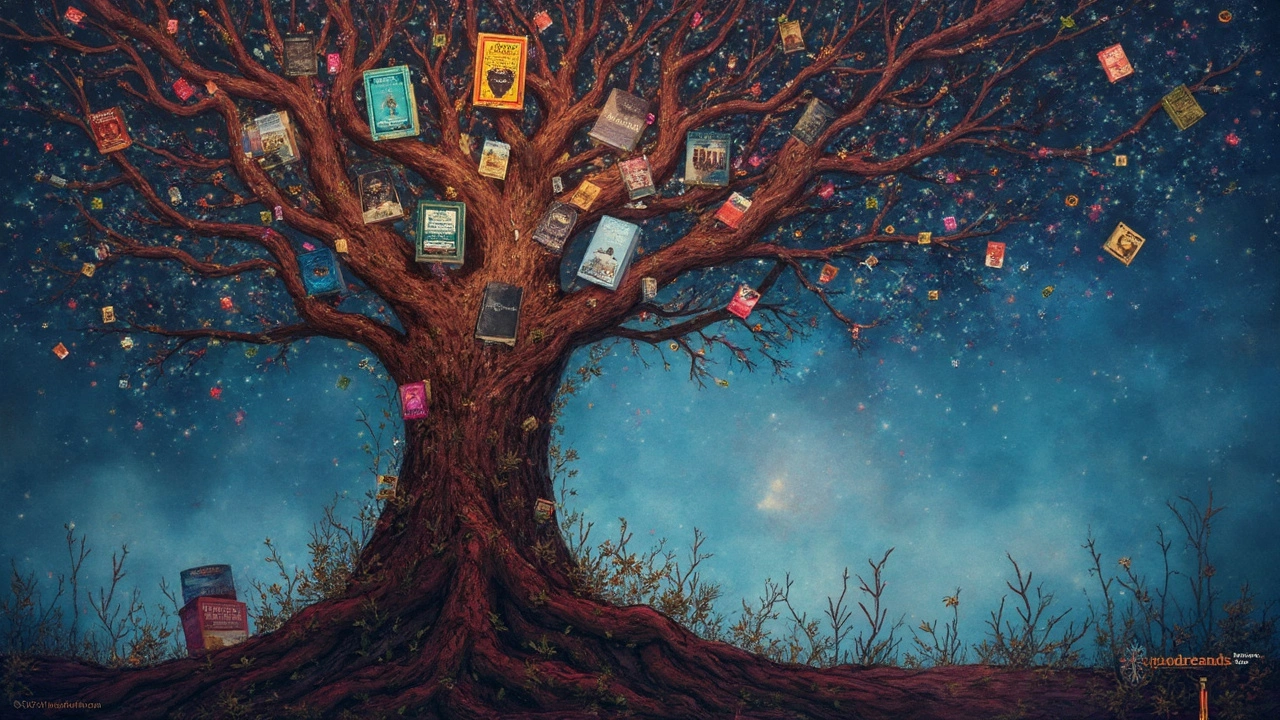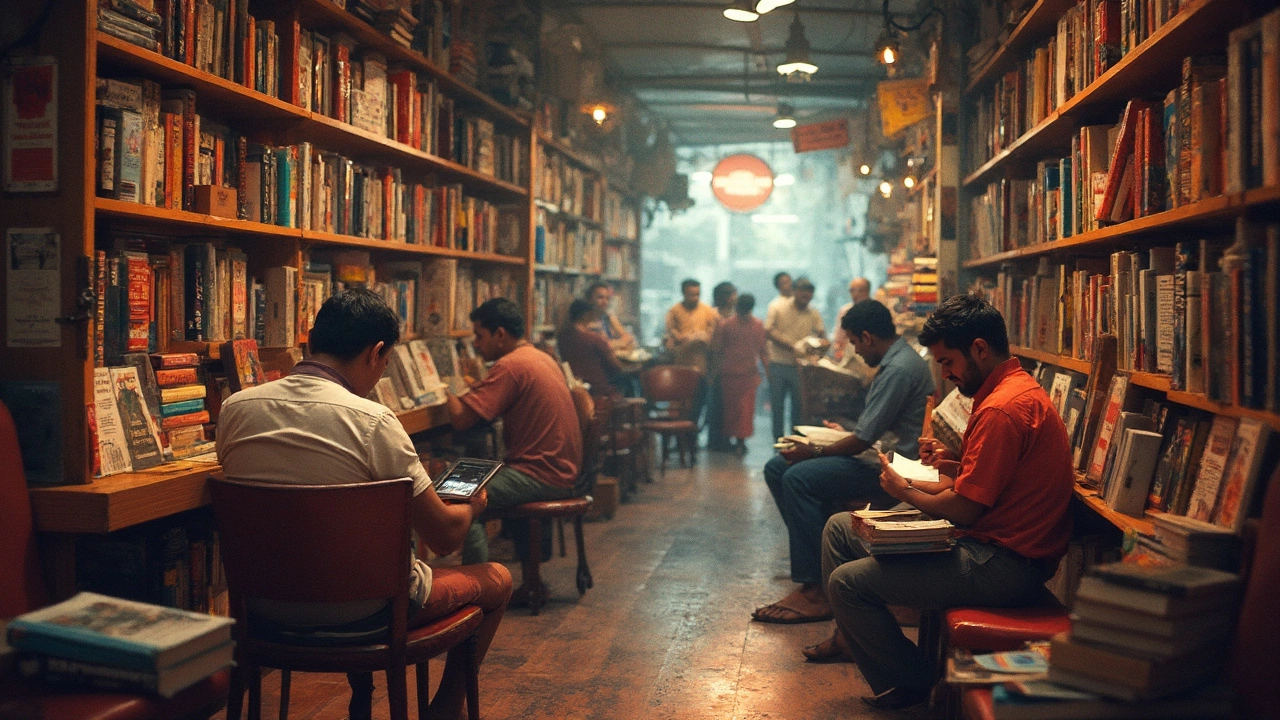Does Jeff Bezos Own Goodreads?
 Apr, 1 2025
Apr, 1 2025
You ever find yourself lost in the sea of book reviews on Goodreads, wondering how it came to be? And if Jeff Bezos, the mastermind behind Amazon, has his fingers in this pie too? Well, you're not alone. The story of Goodreads is pretty entwined with the tech giant known as Amazon.
Back in 2013, Amazon acquired Goodreads, expanding its reach into the world of book lovers everywhere. But does that mean Bezos himself is pulling the strings behind your favorite book-listing platform? Not exactly. While Bezos founded Amazon, his direct involvement with Goodreads isn't hands-on, but the acquisition certainly aligns with Bezos' vision: integrating and streamlining book buying and sharing.
Goodreads was originally founded by Otis Chandler and Elizabeth Khuri Chandler in 2006, and it quickly grew into a massive virtual library. This caught Amazon’s eye, which swiftly swooped in, adding another jewel to its crown of acquisitions. The move was strategic—tying Goodreads' vast network of readers and their endless streams of reviews to Amazon’s retail might.
- Introduction to Goodreads
- Amazon's Acquisition of Goodreads
- Jeff Bezos' Role and Influence
- Impact on Authors and Readers
- The Future of Goodreads
Introduction to Goodreads
Goodreads is a haven for book lovers who want to talk about stories, discover new reads, and get recommendations all in one place. Founded in 2006 by Otis Chandler and Elizabeth Khuri Chandler, it started as a small, cozy community but quickly turned into a bustling social network for book enthusiasts everywhere.
The concept behind Goodreads is simple yet brilliant: a platform where people can rate books, post reviews, and create a virtual 'to-read' list. It's like the ultimate book club, but without the hassle of setting up a meeting time that works for everyone. Amazon Goodreads has everything you need to dive into book conversations or just quietly keep track of what you plan to read next.
Before you even think about buying or picking up a book, you can check out its average rating and read what others have to say about it. With features like group discussions, reading challenges, and lists sorted by a million categories (ever wonder what the best books of 2010 were? They've got a list for that), it's no wonder Goodreads gained traction so quickly.
Goodreads also provides a neat hub for authors. They can interact with readers and announce upcoming books, making it a two-way street between creators and their audience. This inclusive space has made it easier than ever for readers and writers to connect over their shared love of books.
If you're trying to understand how Goodreads fits into Jeff Bezos' empire, knowing a bit about the platform's history and features is a good start. Before the Amazon's acquisition of Goodreads, it had already established itself as a major player in the book world, making it ripe for becoming part of a larger ecosystem.
Amazon's Acquisition of Goodreads
Back in March 2013, Amazon decided to bring Goodreads under its umbrella. This was a major move in the book world, sparking curiosity and excitement among readers and authors alike. For those not in the know, Otis Chandler and Elizabeth Khuri Chandler started Goodreads in 2006 as a place for folks to rate books and discover new reads through community reviews.
Why did Amazon make this deal? Well, they've always had a knack for creating a one-stop-shop feel. With Goodreads, they tapped into a passionate community of book enthusiasts—basically adding a warm, fuzzy layer of book chatter to their usually slick, commercial surface.
The acquisition wasn't just about buying another company. It was about integrating an extensive network of user-generated reviews directly with Amazon’s retail platform. By doing this, Amazon could offer their shoppers not just books, but a community space to share thoughts and get recommendations.
Surprisingly, the details of the deal weren’t heavily publicized. But we know it helped shape Amazon’s strategy going forward by enhancing its e-book division and squeezing competition from other book retailers.
Remember when you’d check a book on Amazon, only to be nudged gently toward Goodreads reviews? That’s the power of this integration. It helped Amazon not just sell books, but keep readers engaged and coming back for more social interaction.
Jeff Bezos might not be running the day-to-day at Goodreads, but the marriage of retail giant and digital library changed a lot about how we talk about and discover books online.

Jeff Bezos' Role and Influence
When it comes to the relationship between Jeff Bezos and Goodreads, it's less about him personally managing the day-to-day operations and more about how his broader strategies have impacted the platform. Bezos is known for his visionary approach to business, and his influence is evident in how Goodreads aligns with Amazon’s overall goals.
Goodreads was bought by Amazon under Bezos' leadership in 2013, but he's not directly running the show there. Instead, he has people who ensure that Goodreads fits into Amazon's ecosystem, helping it integrate with other Amazon services like Kindle and Audible. This synergy creates a seamless experience for readers who want to sync their reading progress across platforms.
Though Bezos himself is not crafting Goodreads’ features, his influence is clear in how the platform has been leveraged to benefit authors and keep users engaged. For example, Goodreads offers options for author book sign-ups, reviews, and giveaways—all of which are designed to make the platform attractive for avid readers and those who push books to the top of sales charts. This focus on community and user engagement reflects Bezos' classic strategy of building strong networks.
Still, some book enthusiasts worry about what this Amazon integration means for independent bookstores and the diversity of available options. But from a business perspective, the acquisition supports Bezos' vision of a one-stop shop for books, making it easier for people to discover and buy new reads directly through mutual platforms.
So, while Bezos might not be tweaking Goodreads’ algorithms himself, the broader corporate strategy continues to bear his mark. While folks browse Goodreads for the next great novel, they’re also immersed in an ecosystem built and branded under his watchful eye.
Impact on Authors and Readers
So, what does Amazon owning Goodreads mean for those who eat, sleep, and breathe books, and those who write them? It's a mixed bag, honestly. For authors, especially those who self-publish, Goodreads is a game-changer. It’s like having a giant book club where your book can get all the buzz it needs. Authors have a platform to connect directly with readers, answer questions, and get fresh feedback.
"Goodreads has opened new doors for authors to gain visibility. It's not just about marketing anymore; it's about genuine reader interaction," says Jane Friedman, a renowned publishing expert.
For readers, it means an even more seamless experience when it comes to discovering and buying books. Amazon’s integration allows you to find a book review on Goodreads and purchase it instantly on Amazon. If it’s on Kindle, even better. Everything's about convenience, right?
But hey, it's not all rainbows and unicorns. Some readers feel this corporate backing takes away Goodreads’ grassroots charm. Plus, there’s that feeling of being nudged towards Amazon for purchases instead of supporting local bookstores.
Still, there are some upsides. For starters, the data flow between Goodreads and Amazon allows for personalized recommendations. Those often hit the nail on the head, suggesting books you didn’t know you needed in your life. Also, stats show that a Goodreads presence can drastically boost book sales, particularly for new releases that hit high ratings quickly.
| Impact Areas | Positive | Negative |
|---|---|---|
| Author Visibility | High | Low control over presentation |
| Reader Experience | Seamless purchases | Less support for local stores |
| Book Sales | Increased via recommendations | Dependant on Amazon |
Whether you love or hate the Amazon effect on Goodreads, it’s clear that the platform continues to be a beloved tool for readers and a powerful marketing ally for authors. Just make sure you know where your clicks are taking you!

The Future of Goodreads
Looking forward, what's in store for Goodreads? Well, with Amazon's backing, the possibilities are pretty wide open. They're already hinting at more integration with Kindle, which means readers might get recommendations directly based on their reading habits. This kind of synergy could keep users more engaged and buying books through Amazon.
A lot of Goodreads users are hoping for an overhaul of the site's interface. Let's face it, in a world where apps and sites are sleek and modern, Goodreads' layout feels a bit clunky. There's been chatter about updates that might let users have a more personalized experience, tweaking the platform to better suit individual reading journeys. Imagine faster, more intuitive ways to keep track of what you've read or want to read.
There’s also the buzz around social features. Goodreads can dip a little deeper into this, maybe introducing better tools for group reading sessions or more interactive author events. People love feeling part of a community, especially in book clubs and reading groups.
Of course, there's the question of monetization. With Goodreads under Amazon's umbrella, we might see more tailored advertising or premium memberships, delivering extra features for those willing to pay. However, they’ll need to walk the line carefully to keep the current user base happy while also bringing in new features.
Lastly, let's not forget about indie authors. Goodreads could focus on building better tools for them to promote works and connect with fans. It could become an even stronger platform for discovering hidden literary gems. Whatever the direction, the future seems like a chapter worth reading.